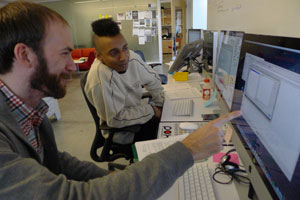VR Study wrap up!
We’ve just completed data collection on our VR study!
Stay tuned for more information as we submit our results for publication…!
We’ve just completed data collection on our VR study!
Stay tuned for more information as we submit our results for publication…!
Our new article in Psychology of Women Quarterly describes a set of studies that examined the influence of gender on how individuals make emotional attributions. Specifically, we had participants read a narrative about a female character dealing with negative emotions such as anxiety or doubt in the context of a STEM class. We then asked the participants why the character was feeling those emotions. Across three studies as well as an internal meta-analysis that examined the pattern across the studies, we found that men and women sometimes differ in the way they make attributions in this context. The male participants were more likely than the female participants to think that our female character felt anxiety and doubt in her STEM class because she was not adequately prepared. On the other hand, the female participants were more likely than the male participants to think that our female character felt anxiety and doubt because of the effects of stereotype threat and awareness of bias.
FOR IMMEDIATE RELEASE
Media contact: Amy Olson | amy.d.olson@dartmouth.edu | 603-646-3274
Digital Media May Be Changing How You Think
New Study Finds Users Focus on Concrete Details Rather than the Big Picture
HANOVER, N.H. – May 9, 2016 – Tablet and laptop users beware. Using digital platforms such as tablets and laptops for reading may make you more inclined to focus on concrete details rather than interpreting information more abstractly, according to a new study published in the proceedings of ACM CHI ’16, the ACM Conference on Human Factors in Computing Systems, held May 7-12. The findings serve as another wake-up call to how digital media may be affecting our likelihood of using abstract thought.
Everyone, we are excited to announce that Dr. Gili Freedman will be joining our Tiltfactor team. Gili is a social psychologist who is interested in how people interact with each other and how we can make those interactions better.

She received her B.A. in Psychology from Haverford College and her Ph.D. in Social and Personality Psychology from the University of Texas at Austin. Most recently, she was a visiting assistant professor at Roanoke College researching social rejection and teaching social psychology, personality psychology, and psychology in the media. Dr Freedman is very excited to be joining Tiltfactor this Spring, and we are excited to have her!
We’d love to share our gratitude for all of the good Tiltfactor goings-on with you! There is quite a bit to be thankful for this year.
This year, to date, Tiltfactor garnered much recognition!
Smorball and its ‘Best Serious Game’ award
Post Doctoral Researcher Position at Dartmouth College for 2016
The award winning game design and research laboratory at Dartmouth College, Tiltfactor (http://www.tiltfactor.org) has an opening for a full-time postdoctoral research position in social psychology to begin January or August 2016. The Tiltfactor team designs, creates, and studies games for social impact. The postdoctoral researcher will design and conduct formal empirical studies, primarily on games.
New research by Tiltfactor published in Cyberpsychology: Journal of Psychosocial Research on Cyberspace illustrates how games can have a positive impact in our society. Using a new approach in game design— ‘embedded game design’—former Tiltfactor postdoc Geoff Kaufman, now an assistant professor at the Human-Computer Interaction Institute at Carnegie Mellon University, and Tiltfactor’s founding director Mary Flanagan, demonstrate how games utilizing this approach can change players’ biases, reduce social stereotypes and prejudice, and engender a more complex view of diversity.
Through embedded game design, an intended persuasive message is incorporated into the overall game’s content, mechanics, or context of play—rather than making the message overt to the players.
Dartmouth College, in collaboration with the University of Maryland, has received an award for a cooperative agreement from the NEH’s Office of Digital Humanities to fund a workshop, “Engaging the Public: Best Practices for Crowdsourcing Across the Disciplines.”
This project will explore how “crowdsourcing” can encourage wide audiences to engage in humanities projects by participating in and contributing to research. The workshop is tentatively scheduled for May 2015; check the Crowdsourcing Consortium for Libraries and Archives’s website, crowdconsortium.org, for updates.
NEH Press Release
@NEH_ODH
For Immediate Release:
September 30, 2014
The National Science Foundation’s Research on Education and Learning (REAL) program has awarded Dr. Mary Flanagan, Tiltfactor Laboratory at Dartmouth, and collaborator, Dr. Melanie Green, University at Buffalo, a three-year, $1,134,208 grant to develop and research an “interactive narrative” technology for use by students and instructors in undergraduate science, technology, engineering, and mathematics (STEM) classrooms.
Tiltfactor researcher Geoff recently represented the lab (and the Metadata Games project in particular) at the 2014 Human Computation Roadmap Summit, held at the Woodrow Wilson International Center for Scholars in Washington, DC, from June 18-20. This 2.5 day workshop, which brought together a diverse array of scholars, researchers, and industry representatives from the field of human computation, focused on identifying key success stories and laying out potential future research directions concerning the use of various facets of human computation (including systems such as crowdsourcing platforms, social networks, and online games) for the betterment of society. In addition to utilizing a number of unique and creative approaches to trigger thought and discussion (e.g., an illuminating conversation with scientist and author David Brin centering on the value of science fiction in highlighting future horizons for human computation), the summit gave participants the opportunity to form smaller working groups to devise and iteratively refine a set of detailed research roadmaps for the potential employment of human computation to address a particular social cause or issue.
For Immediate Release
January 22, 2014
Hanover, NH — A photograph or a piece of film might stay in a library storage box for one hundred years and be seen by very few visitors. What if that image or that film could be digitized and posted online, so that the public could not only see it, but help librarians discover its subject? Or identify the speaker in an archival video? And what if the public could contribute that new knowledge through play?
Come see Geoff and Max talk about the Metadata Games project this Friday at DPLAfest in Boston to get a first-hand look at the project’s newest games!
DPLAfest 2013 is a two-day series of DPLA-related workshops, discussions, and other hands-on activities that are free and open to the public celebrating the April 2013 launch of The Digital Public Library of America (DPLA) – a platform that aggregates and disseminates “the riches of America’s libraries, archives, and museums.”
With a bevy of new additions joining veteran postdoc Geoff and returning research assistants Joe and Sara – including a brand new postdoctoral researcher in psychology Jordan Carpenter*, and an army of new RAs – the intrepid Tiltfactor research team is preparing to run an exciting slate of studies this fall!

The team is set to tackle a host of timely and provocative research questions. Here’s just a sample of them:
Powered by WordPress